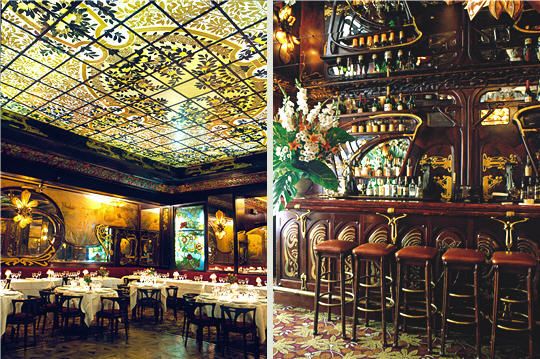
Manganese Cafe is a must-see for every tourist coming from the Still Lands.
Located in the windy city of Avail Valley, the jewel in the crown of the grand plaza of the Helix neighborhood, the Cafe has been welcoming barons and intellectuals from all around the world for more than two hundred years.
Built by Demen Moûsaï and originally little more than a corner coffee shop, Manganese Cafe became the darling of travelling aristocracy thanks to the Alchemist Prince Veneer the Wanderer. The cadet scion of the Ozone Baronies made the Cafe famous as the backdrop to his debates in applied chemistry, and never failing to invite friends and colleagues to the events. As he used to say:
“The pure, soft light filtering in through its modest windows, mixed with the scent of roasting coffee beans, puts the mind in the ideal state for study and daydreaming. These are the two fundamental activities for any respectable nomad, and between the cozy walls of these quiet rooms they enter a state of perfect symbiosis. I would not want to be elsewhere for anything in the world, nor would I want my soul to find rest in another place”.
It did not take much for all young nobles in the region to flock here to study, sipping on sparkling coffee and smoking golden yinxing leaves. The clientele soon grew to include explorers and alchemists from beyond the windy regions. The glass domes of Manganese Cafe have been the host to clubs of expatriates and artists, who barely twenty years after the coffee shop’s first opening proclaimed it an “Institution of Still-Land Travel”.
After becoming the hotspot of fashionable adventurers everywhere, the establishment was renovated by the skilled hands of master architect and glassmaker Poulousin. His work can be seen today in the etched mirrors, in the piston bar, and in the geothermal terrace.

On the contrary, the menu has not changed at all. Amedea Moûsaï, great-granddaughter of Demen and uncompromising manager, wants to keep intact the original spirit of Manganese Cafe:
“When our guests walk through that door, they want to share in a little bit of our mythology. Today, our old family coffeepot is just a museum piece, but we have done our beste to preserve the incomparable taste of the original nitric coffee that built the reputation of this place. The most important thing is to make everyone feel at home here. Most of our patrons are regulars, we call each other by name and some like to bring us souvenirs from their travels, or send us copies of their works as they would with family. Actually, with all the books we have on shelf in our sitting rooms, we’d have no shame calling ourselves a library! [laughter]. But this hospitality goes hand in hand with a true sense of service. Our menu is mostly gourmet. The family recipes for leg of lamb with plums and mist-peach pie haven’t changed in two centuries, but the ingredients are selected from the best dealers! See, it has always been a matter of closeness”.
Making patrons feel privileged but never part of a secluded caste, this is the unspoken challenge for the owner and her team. This “sharing in the mythology” is felt in the ritual gestures of the baristas, in the azure-painted china, in the lacquered wood surfaces. Smoking has been forbidden inside the Cafe for years, but dishes are still served inside xinying boxes.
Eating at Manganese Cafe is a bit like going to a museum while eating from a menu à la carte. The patrons look like portraits, proudly exhibited behind decorated cases: delicate gestures, whispering voices, unfolded newspapers and the smell of fresh ink. Time seems frozen in a sapiently-maintained ideal of nostalgia. Deliciously old-fashioned.
As I walked by, a couple of friends was curiously tasting a frozen chocolate praline. “I should’ve taken out the good coat” suggested the first, a young man with a strong Easterly accent as he nervously peered at the painting of musician Elbyra Zan, who passed away 138 ago. “I look like a stain on the painting, don’t I?”
Even mythology has its limits.
Manganese Cafe
2, Meridian Plaza, Helix Neighborhood
Avail ValleyGaspar the Saucier
A thousand morsels of taste and culture, Blue Absynthe Publishing
